‘Record surplus’: Winners, losers in Queensland budget as treasurer reveals huge cost of living relief
One group will have thousands returned to their wallets as the state government hands down a cost-of-living budget.
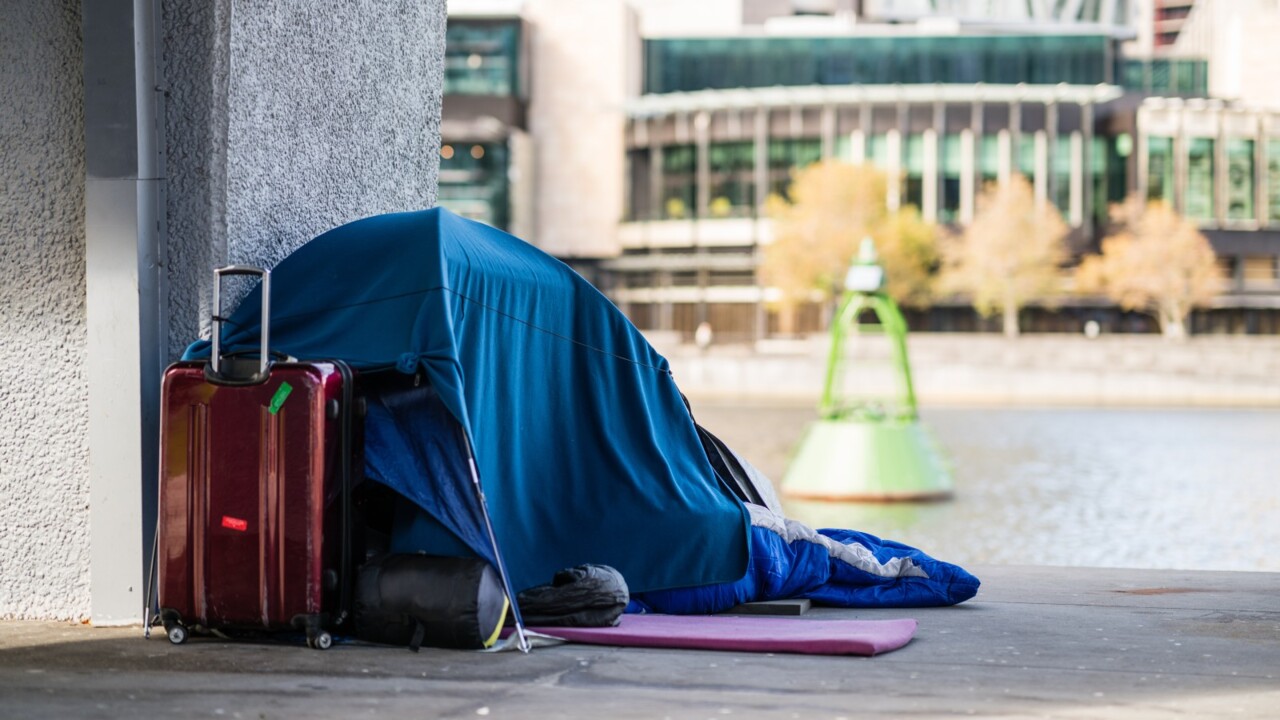
Costs
Don't miss out on the headlines from Costs. Followed categories will be added to My News.
Queensland families have emerged as early winners in the state’s budget, with kids being eligible to attend kindy at no extra cost and a $550 power bill relief being promised to struggling residents.
While handing down his fourth budget on Tuesday, Treasurer Cameron Dick said the government had achieved a “record surplus” and promised Queenslanders “help is on the way”.
“Through this budget, Queenslanders will receive cost of living relief through their electricity bill, higher than anyone else in Australia,” he said.
Mr Dick said the $12.3b surplus would “pay down” state debt while promising a major infrastructure spend.
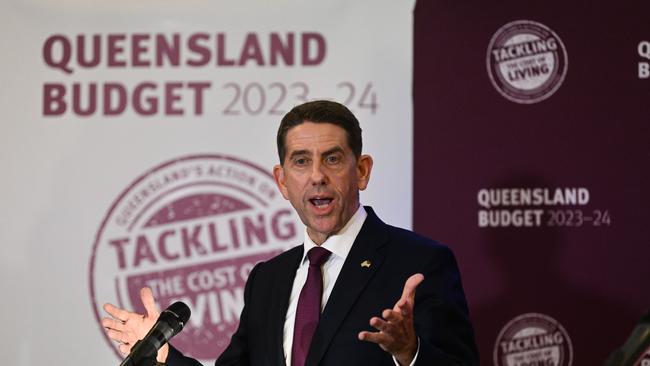
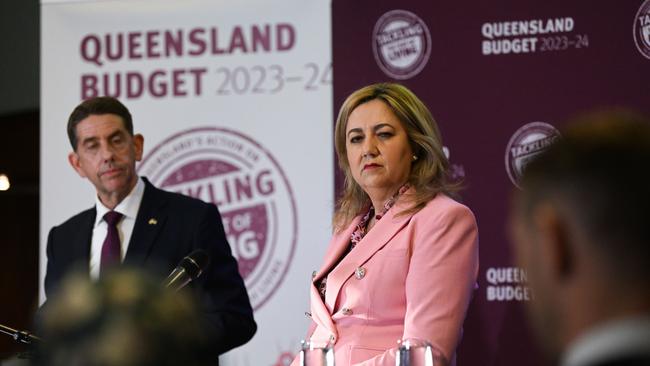
The state’s net debt has fallen to $5.8b, lower than the $19.7b it was set to be this financial year.
Those low levels of debt are not expected to continue, with the figure to climb to $47b in 2026/27.
Progressive coal royalties, which have been the subject of controversy, had delivered “rewards” for Queenslanders, Mr Dick said.
He said the “Big Build”, a record four-year $89b capital program, would support some 58,000 jobs across the state.
A payroll tax discount for regional businesses has been extended June 2030.
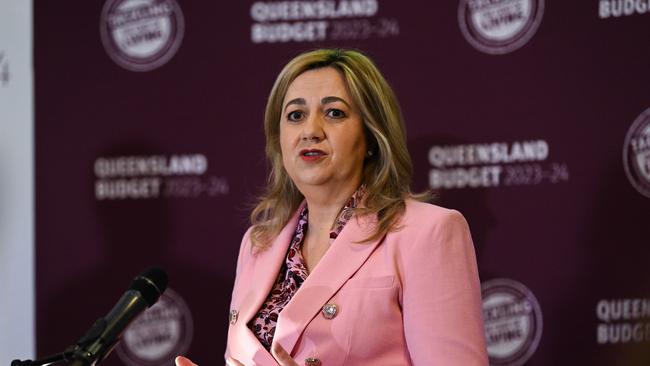
Mr Dick said the highest priority of the budget was cost of living relief, revealing the government would deliver a major expansion of the electricity rebate program as part of their $8.2b cost of living relief measures.
All households will automatically receive a $550 rebate on their electricity bill in 2023-24.
Around 600,000 vulnerable households will benefit from a higher rebate of $700 – in addition to an existing rebate of $372.
Mr Dick said around 205,000 businesses across the state would be entitled to an electricity bill rebate of $650.
“The Palaszczuk government recognises the considerable cost of living challenges being faced by Queenslanders and is tackling these challenges,” he said.
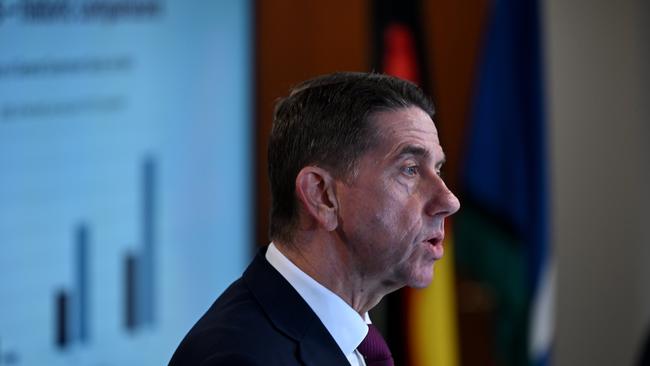
“Queensland’s economic strength and success has allowed the government the opportunity to invest wisely in easing cost of living pressures for all Queenslanders.”
This year’s budget was not met with much support from the Opposition, with Liberal National Party Leader David Crisafulli saying the state government is “addicted to announcements but never actually delivers”.
“After eight years in power, Queenslanders can no longer trust this Government to fix the problems they’ve created,” he said in a statement.
“Whether it’s health, housing, rising youth crime or the cost of living, we’ll keep putting our solutions on the table.”
The government had already promised significant cost of living relief for struggling families in earlier interviews, including a “historic investment” for children and families to allow thousands of kids to enter kindy at no extra cost.
It will cost the budget bottom line $645m and bring the state’s investment in kindergarten to $2bn over four years.
The cash splash will mean 50,000 additional kids will be able to attend kindy at no extra cost. Currently, about 14,000 Queensland families are eligible for free kindergarten.

Ms Palaszczuk said it was expected to save eligible families around $4600 per year.
“This investment will put thousands of dollars back into the pockets of families at a time when we know people are doing it tough and support parents getting back into the workforce,” she said ahead of the budget’s release.
“There are currently around 8000 children who are eligible to attend a kindy but don’t, and it’s time to close that gap.”
The package includes $120m to attract and retain teachers.
Queensland Government’s Cost of Living Support
- $550 Cost of Living Rebate on electricity bills to all Queensland households
- $700 Cost of Living Rebate on electricity bills for vulnerable households, in addition to the existing $372 under the Queensland Electricity Rebate Scheme, bringing total rebates for this group to $1,072
- $650 rebate on electricity bills for around 205,000 eligible small businesses, cutting the cost of doing business in Queensland
- $645 million over 4 years for 15 hours per week of free kindy for all 4-year-olds
- $70.3 million over 4 years to increase assistance to regional patients through the Patient Travel Subsidy Scheme
- Up to $150 for eligible children aged 0 to 4 years for learn-to-swim activities
- $2.7 million over 2 years to extend and expand school breakfast programs in areas experiencing hardship across Queensland
- $315,000 to provide grant funding to Foodbank to deliver critical food relief.
PREMIER PLEDGES HOUSING BOOST
As Queensland continues to grapple with a housing shortage, the state government has vowed to “pull every lever possible”, starting with a $322m cash injection to build around 500 social homes.
“We recognise that this is a big issue out there for families,” Ms Palaszczuk told reporters in Brisbane on Monday.
“We also know that thousands of people continue to move to Queensland and that is putting additional pressure on our housing markets up right across the state, even in regional Queensland.”
Sunshine State residents continue to endure skyrocketing rental prices amid the cost of living crisis, with Brisbane rents increasing 11.6 per cent in the past year.
According to PropTrack, the median rental price of houses in the city is $530 per week, while the rental price of units, which has risen 10 per cent, remains at $440 per week.
The new funding builds on the $3.9bn already invested in social and affordable housing, which the state government says will deliver 13,000 new homes across the state.
The sites of the new 500 social homes are yet to be announced.

Monday’s announcement was met with a warning from the Queensland Council of Social Services, with chief executive Aimee McVeigh saying it was “inadequate” given the housing crisis faced by residents.
“The Palaszczuk government has recognised that what is needed most to fix the state’s housing crisis is housing supply, but adding only 500 social homes to the Quickstarts program is nowhere near enough,” Ms McVeigh said.
“The reason so many Queenslanders are experiencing homelessness is that there aren’t enough social and affordable homes for people to live in.
“The Queensland government has been building social and affordable housing at a glacial pace – at a much slower pace than what the private sector is delivering.”
The government will also spend $64.3m to purchase and lease of emergency accommodation facilities in Brisbane
The accommodation will provide immediate support for people experiencing or at risk of homelessness.
The funding will be spent on purchasing and leasing crisis accommodation sites in inner Brisbane, including boarding houses and hotels.
Ms McVeigh said she welcomed the announcement in Brisbane but questioned the government’s plan for the rest of Queensland.
“It’s important though that our politicians don’t forget that Brisbane isn’t the only area where Queenslanders are experiencing and facing homelessness. This is a crisis right across the state,” she said.
Meanwhile, a further $10m will be committed to convert Brisbane’s Pinkenba quarantine facility into emergency accommodation.
The Salvation Army has offered to help with its management.
Meanwhile, Mr Dick said Tuesday’s budget would also focus on health, community safety and improving the cost of living for Queenslanders.
Other Queensland budget winners
Huge hydro project – $14bn will be committed to one of the country’s most expensive renewable energy projects.
The billions of dollars will go to the total cost of the 2 gigawatt Borumba pumped hydro project in the Sunshine Coast hinterland, which will supply 24 hours of energy to the grid.
It is expected to be finished by 2029.
Indigenous councils – an additional $25.8m will be added to the more than $44m per annum in Indigenous councils’ funding arrangements.
The funding will support the delivery of essential services in communities including maintaining water and road infrastructure to those 16 councils that don’t rely on rates.
Fire and Emergency Services – $2m will fund the acquisition of land for Fire and Emergency Services in Bundaberg.
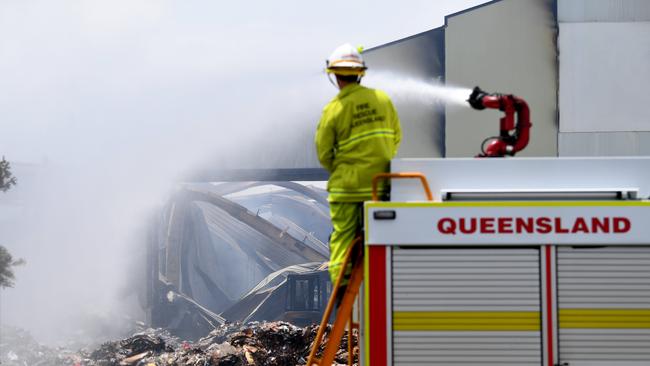
While the site is yet to acquired, it will potentially host co-located Fire and Emergency Services and State Emergency Service facilities.
Bundaberg East levee – $174.7m joint federal and state funding to provide better protection for parts of Bundaberg East, Bundaberg South and the CBD.
The construction of the levee will support more than 100 jobs during the projects construction.
Medical services – $21.96m has been announced for allowances to attract nursing and midwifery students to the regions.
Each final-year nursing and midwifery student who moves to a regional community for their placements will receive $5000 to go towards fuel, accommodation and food.
Meanwhile, $150m has been announced for the ongoing expansion of the Redland Hospital.
Swimming lessons – Families with children under four will gain access to state-funded swimming lessons.
There will be 30,000 $150 vouchers for those who have a guardian with a healthcare card or pensioner concession card.
The program will be funded with $4.8m over the next two budgets.
Queensland budget losers
Small businesses – There’s no extra help provided to small business owners from the state government, with energy rebates not increased.
Approximately 205,000 eligible small businesses currently receive a $650 energy bill rebate, something which will not be increased during this budget.
Renters – Renters have pulled the short straw this budget, with no extra measures announced to assist with renting in the cost of living crisis outside of social housing.
Coal miners – With the budget raking in billions from coal royalties, the Palaszczuk government is extending its royalty system.
The three-tier system gives Queensland the highest-taxing royalty rate across the globe.
The highest rate of 40 per cent for prices above $300 a tonne has been criticised by mining companies.
Criminals – More than $446 million will be spent on programs and services to prevent youth crime over the next five years.
There will be $37 million spent each year targeting “serious, repeat offenders”, and $89.7 will be spent over five years addressing capacity issues in youth detention centres.
The government will also spend $132 million on increasing police patrols and supporting victims, while $30 million will be spent helping seniors secure their homes.
Originally published as ‘Record surplus’: Winners, losers in Queensland budget as treasurer reveals huge cost of living relief




